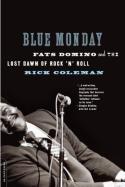Rick Coleman - Blue Monday
|
Subtitled "Fats Domino and The Lost Dawn of Rock 'N' Roll" this is decidedly more than a biography of an R&B legend - it also succeeds in placing Fats at the very heart of the birth of rock 'n' roll and rightly acknowledged as one of the greats of black American music. The recent exposure to New Orleans culture that resulted from the extremely sad and devastating consequences of hurricane Katrina has perhaps in some way blinded us to just how little credit Domino has previously received for his role in the development of R&B and its rock 'n' roll sibling. As far as I am aware, this is the first attempt to definitively chronicle Domino's life and work; when you think about the press and general media coverage of many of his contemporaries, that fact alone is a sad reflection on how badly his legacy has been served until now. So, it's pleasing to report that this is a rich and full portrait not just of the man and his music, but also the historical and cultural context in which Fats' music was developed. Along with a wealth of recording detail that helps frame Domino's musical innovation and development, Coleman also explores the wider cultural landscape of the time. Compiled from material that stretches back over twenty years, the book does a truly excellent job of pulling Fats out of the 'historical shadows' - even though he was one of the first inductees of the Rock and Roll Hall of Fame, until recently there was little or nothing posted about him on the website; and he's been unjustifiably omitted from other worthy tomes that purport to document the history of rock and/or R&B (e.g. The Rough Guide To Rock, African American Lives) whilst they feature worthy but less talented contemporaries. Full of insight and fascinating period detail, I suspect only those totally uninterested in popular music would not be fascinated by this story. Often decried as harmless and non threatening by rock revisionists, this is a man whose cross country tours featured more integrated audiences than most others of the time and which were often the scene of rock 'n' roll riots. Not because the man himself exhibited particularly outrageous tendencies - he wasn't a tortured soul, didn't do drugs or trash people or hotels - but because his music crossed cultural divides and succeeded despite rather than because of the social climate of the time. In so doing he quite clearly popularised authentic black music rather than the diluted form that had previously been found on American top twenty radio. And Fats always believed he wrote, played and sang rhythm and blues because "rock 'n' roll is rhythm & blues". The fact that he had so many rock 'n' roll hits and became so universally popular is just something for which we should all be grateful. This extremely detailed and well written book does much to redress the balance and place Fats at the centre of a musical and cultural phenomenon. |
|

Leave a comment